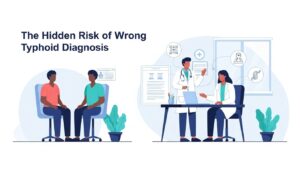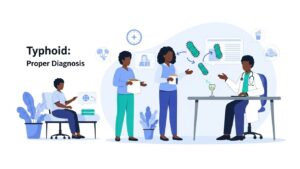Understanding Diabetes: A Growing Concern in Nigeria
Diabetes is a long-term illness that alters how your body uses glucose, or blood sugar. Diabetes is becoming more common in Nigeria, in part because of sedentary lifestyles, changing diets, and urbanization. The World Health Organization estimates that millions of Nigerians, many of whom are unaware of it, have diabetes. Understanding the importance of food for diabetic patients in Nigeria and choosing the right food for diabetes in Nigeria can significantly improve health outcomes. Adopting a proper food for diabetes in Nigeria is essential for managing this growing health challenge effectively.
Why Is It Important?
Serious health issues like heart disease, renal failure, eye loss, and more can result from untreated diabetes. Appropriate management and early discovery are crucial.
Identifying Diabetes Symptoms: Pay Attention to the Indications
Many people in Nigeria mistake early diabetes symptoms for ordinary exhaustion or stress. The following are the most typical warning indicators:
- Urinating a lot, especially at night
- Too much thirst
- Unaccounted-for weight loss
- Continuous exhaustion
- Vision blur
- Wounds that heal slowly
- Numbness or tingling in the hands and feet
Time for a Story:
Adewale, a 42-year-old Lagos father of three, observed that even though he was eating healthily, he was constantly thirsty and losing weight. He dismissed it as work-related stress. Neither didn’t he visit Well-life Hospital and receive a type 2 diabetes diagnosis until he passed out during a family get-together. He was able to restore his health with early intervention.
Advice: See a doctor right away if you experience any of these symptoms. The key is early diagnosis!
Diabetes in Nigerian: Healthy Eating
You don’t have to give up all of your favorite things to manage diabetes. It’s about balancing your meals and making better decisions.
Appropriate Food for Diabetic patients in Nigeria?
- Whole grains: include whole wheat bread, millet, brown rice, and ofada rice.
- Lean proteins: include eggs, beans, fish, and skinless chicken.
- Vegetables and fruits: Oranges, carrots, okra, ugu (pumpkin leaves), and garden eggs—enjoy in moderation.
- Healthy fats: include avocado, groundnut oil (in moderation), and palm oil.
Foods to Steer Clear of Limit
- Sugary beverages (sweetened juices, soft drinks)
- Pastries and white bread
- Snacks and fried foods (chin-chin, puff-puff)
- Red meat and fatty cuts in excess
Useful Example:
Try a smaller portion of ofada rice with grilled fish and steamed vegetables instead of a big plate of white rice and fried steak. Replace sugary beverages with unsweetened zobo or water.
Portion Control Is Important
If consumed in excess, even nutritious foods can raise blood sugar levels. Make use of smaller plates and arrange the veggies on half of them, followed by the protein on a quarter and the whole grains on a quarter.
Healthy living for diabetes in Nigeria: not just diet
Diet is only one aspect of the situation. Here’s how to complete your diabetes treatment strategy:
1.Continue to be active
On most days, try to get in at least 30 minutes of moderate activity. You can increase your heart rate by dancing, walking, and even playing traditional Nigerian activities.
Fun Fact: Did you know that regular exercise improves the way your body uses insulin? After supper, even a quick stroll might have a significant impact.
2.Check Your Blood Sugar
However, follow your doctor’s advice and monitor your blood sugar levels. This enables you to comprehend the effects of stress, exercise, and food on your body.
3.Control Your Stress
Blood sugar levels might rise as a result of stress. Try some relaxing methods, such as prayer, deep breathing, or light stretching.
4.Frequent examinations
Ensure routine visits to your healthcare practitioner help spot any difficulties early and keep your management plan on track. Complete diabetes care, from diagnosis to continuing support, is provided at Well-Life Hospital.
Overcoming Obstacles for Diabetes: Practical Remedies
Nigerian diabetes management presents particular difficulties due to cultural eating customs, hectic schedules, and restricted access to healthful foods. Here’s how you get past them:
- Meal Planning for Active Lives: Make nutritious meals ahead of time. Prepare the week’s worth of vegetables, soups, and beans in advance. For convenient grab-and-go lunches, store in portions.
- Dining Out? Make Wise Decisions: Pick boiled or grilled dishes instead of fried ones. Request smaller servings and include a vegetable side dish.
- Community Support: Connect with Nigerians living with diabetes going through similar struggles or join a diabetes support group. The journey might be made simpler and more pleasurable by exchanging experiences.
When to Get Assistance
Don’t delay if you’re having trouble controlling your blood sugar, feeling overburdened, or noticing new symptoms. Expert assistance can make a huge difference. The skilled medical staff and dietitians at Well-life Hospital are available to help you at every stage.
Go One Step Further in the Direction of Healthy Living
Diabetes is a process rather than a final goal. You can live well and prosper if you have the correct knowledge, support, and daily routine. Keep in mind that thousands of Nigerians are also traveling the same journey, so you’re not alone.






